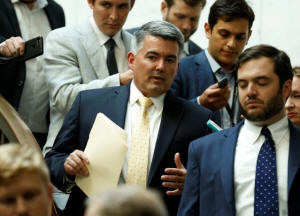|
U.S. election security steps hobbled by
Congress-White House funding fight
 Send a link to a friend
Send a link to a friend
 [August 23, 2018]
By Richard Cowan [August 23, 2018]
By Richard Cowan
WASHINGTON (Reuters) - A battle between U.S. President Donald Trump and
Democrats over federal funding to help secure November's U.S. elections
stymied legislation in Congress on Wednesday, at least for now, that is
aimed at thwarting Russian meddling by strengthening states' voting
procedures.
The Senate Rules Committee unexpectedly canceled a work session that was
intended to advance the Secure Elections Act. That is a bipartisan bill
requiring greater coordination between the U.S. Department of Homeland
Security and a range of other federal and state election agencies as
well as making it easier to audit voting results in the 50 states.
The fight pits Democrats and some state officials against the Trump
administration and Republicans who oppose additional money flowing from
Washington to the states to shore up elections.
It comes on the same day that high-ranking administration officials held
a closed briefing in the U.S. Capitol for all 100 senators to detail
Russian interference in American elections.
Republican Senator Lindsey Graham left that briefing telling reporters,
"Everything we've done on Russia has not worked."

Graham, like many other senators, has been clamoring for Congress to
approve tough new Russia sanctions to ward off Moscow's ongoing Russian
cyber activities. He has not supported new federal funding for states,
however.
"Russia will quit when they pay a heavy price and clearly we have not
done enough yet for them to quit," Graham said.
Also on Wednesday, the Democratic National Committee said it had stopped
a cyberattack on an internal website.
A Senate aide, who asked not to be identified, said the White House put
heavy pressure on Senate Republicans to abruptly cancel Wednesday's
committee work.
Democrats were aiming to attach a provision to the Safe Elections Act to
authorize $250 million to help states conduct audits required by the
legislation. This would be on top of the $380 million Congress earlier
approved for election security.
In a statement, White House spokeswoman Lindsay Walters said the
Department of Homeland Security has all the "authority it needs to
assist state and local officials to improve the security of existing
election infrastructure."
She added that the Trump administration will not support legislation
"that moves power or funding from the states to Washington for the
planning and operation of elections."
[to top of second column]
|

Senator Cory Gardner (R-CO) arrives for a closed senators-only
Capitol Hill briefing on election security at the U.S. Capitol in
Washington, U.S., August 22, 2018. REUTERS/Joshua Roberts

But some state officials disagreed.
Chris Winters, Vermont's deputy secretary of state, said his state
has concerns that the legislation does not contain funding to carry
out some of the provisions being mandated, including state election
audits.
He also said that as written, the bill is "too prescriptive" in some
of its security requirements and could unnecessarily box states in
on how they conduct and oversee elections.
On Nov. 6, all 435 seats in the U.S. House of Representatives and
one-third of the U.S. Senate seats are up for grabs.
Meanwhile, several state attorneys general have complained to
Washington that federal grants being funneled through the U.S.
Election Assistance Commission were insufficient to provide for the
upgraded technology needed.
Senator Amy Klobuchar, the senior Democrat on the Senate Rules
Committee, said following the cancellation of Wednesday's vote:
"With only 76 days before the election ... with no national
requirement for critical security protocols such as audits or backup
paper ballots for our nationís election infrastructure, we must take
action before the next election."
But Senate Majority Leader Mitch McConnell, who has the power to
move legislation through the Senate, refused comment when asked
about the committee delay. McConnell aides also would not comment on
whether he joined the White House in blocking committee action or
whether he would support the $250 million in added funding being
proposed by Democrats.
(Additional reporting by Amanda Becker and Jeff Mason; Editing by
Phil Berlowitz)
[© 2018 Thomson Reuters. All rights
reserved.]
Copyright 2018 Reuters. All rights reserved. This material may not be published,
broadcast, rewritten or redistributed.
Thompson Reuters is solely responsible for this content.
 |